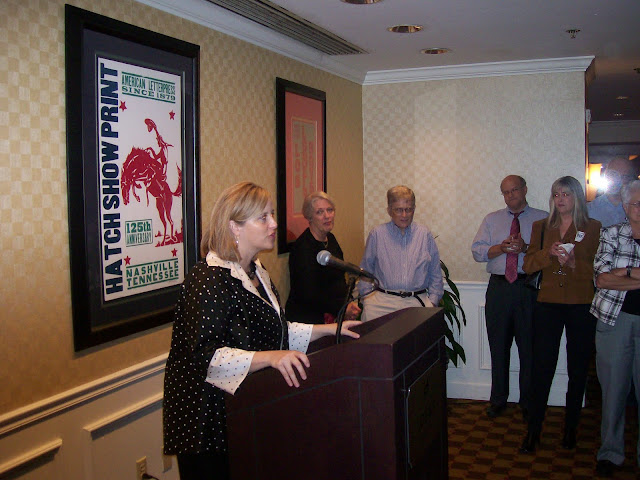
Two years ago on August 18, things changed in Tennessee. Two years ago on that night, I knew the movement for equality was finally going somewhere.
Two years ago on August 18, a non-discrimination ordinance that included both sexual orientation and gender identity passed a critical second reading in Nashville's Metro Council. And it was the first time that ever happened in our state. Introduced by Councilwoman At-Large Megan Barry (pictured right the night it passed on third reading) and several other sponsors, the bill went through with a few bumps but relatively unscathed. But by the end of the night we knew we were close to victory. That night set the stage for so many things to come well beyond September 25 when Mayor Karl Dean signed the NDO into law.
Realizing the NDO's Potential: Fast forward to late November/early December 2010. We began hearing reports that Belmont University was, to put it mildly, having difficulties dealing with their lesbian soccer coach,Lisa Howe, who had announced that she and her partner were having a baby. Given Metro's relationship with Belmont and some of with its key leaders a period of anguished public soul-searching began in Nashville that resulted in Council Members Jamie Hollin, Erica Gilmore, and Mike Jameson filing the Contract Accountability Non-Discrimination Ordinance that finally passed on April 5 of this year. Along the way Mayor Karl Dean instructed Metro's boards and commissions to update their non-discrimination policies to include sexual orientation and gender identity. But both developments were predicated on the principle enunciated in the 2009 non-discrimination ordinance for Metro government employees. It was the foundation of both advances.
Gathering Storm: More ominous developments were brewing, too, which promised to take the debate statewide. Fast on the heels of the CAN DO bill's introduction, Family Action Council of Tennessee, Rep. Glen Casada, and some Evangelical members of the business community gathered at LifeWay to develop strategies to undo CAN DO. Rep. Casada proposed three bills, but ended up running the infamous HB600 that eventually passed and was signed by Governor Bill Haslam. But that would not be the whole story. In the process, Tennessee's four largest cities for the first time actively lobbied against an anti-equality bill. The Tennessee Chamber of Commerce was forced to reverse its position on the bill because of a national outcry assisted considerably by the work of Garden State Equality and Americablog. The Shelby County Commission and several local lawmakers from around the state also opposed the bill. People across the state, across the country took sides on the issue of job discrimination in Tennessee.
Going to Court: Informal discussions of a court challenge emerged in January when the HB600 was introduced. In June Abby Rubenfeld filed suit on behalf of several plaintiffs including Lisa Howe and three members of the Metro Council. But the question of how involved Metro would be in an official capacity lingered. Now we have the answer. This week the Metro Council passed Councilwoman Kristine LaLonde's non-binding resolution asking the Metro Law Department to file an amicus brief in support of the lawsuit. The following day, the City Paper's Joey Garrison reported that the Metro Law Department will file such a brief putting the Metropolitan Government squarely in the fight against the discriminatory state law.
What's Next?: We couldn't have predicted all the potential, both good and bad, that warm August night held two years ago. The passage of HB600 was definitely a low point in the battle for equality in Tennessee. But it's only a pause on the journey that started with Metro BL2009-502. The power of what started with the NDO is not nearly spent. The coalition that came together to pass that ordinance has grown stronger and the conversation continues to expand throughout Tennessee.
-Chris Sanders

1 comment:
Bravo!
Post a Comment